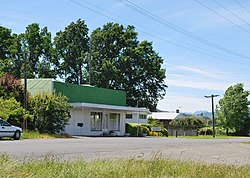Parnassus is a locality in the Canterbury region's Hurunui District on the east coast of New Zealand's South Island. It is located on the north bank of the Waiau River.
Parnassus | |
|---|---|
Locality | |
 The former supermarket at Parnassus | |
 | |
| Coordinates: 42°43′S 173°18′E / 42.717°S 173.300°E | |
| Country | New Zealand |
| Region | Canterbury |
| Territorial authority | Hurunui District |
| Ward | East Ward |
| Electorates | |
| Government | |
| • Territorial Authority | Hurunui District Council |
| • Regional council | Environment Canterbury |
| • Mayor of Hurunui | Marie Black |
| • Kaikōura MP | Stuart Smith |
| • Te Tai Tonga MP | Tākuta Ferris |
| Time zone | UTC+12 (New Zealand Standard Time) |
| • Summer (DST) | UTC+13 (New Zealand Daylight Time) |
It takes its name from a local sheep run owned by a classical scholar, Edward Lee. He saw a likeness between a local hill and the Greek Mount Parnassus, mythical home of the god Apollo and the Muses.[1]
State Highway 1 passes through the town on its route from Cheviot to Kaikōura, and the Main North Line railway from Christchurch to Picton also runs through the town. At one stage, the Waiau Branch was intended to be the main line north and a branch line diverged from the Waiau route in Waipara to service coastal communities. This line was opened to Parnassus in 1912 and was known as the Parnassus Branch at that stage. However, the decision was made to use the Parnassus route as the main line, relegating the route from Waipara through the Weka Pass to Waiau to the status of branch line. The Main North Line was completed in 1945 and continues to serve Parnassus today.
The epicentre of the 1901 Cheviot earthquake was at Parnassus.
Demographics
editThe Parnassus statistical area, which includes Cheviot, covers 994.57 km2 (384.01 sq mi).[2] It had an estimated population of 1,360 as of June 2024,[3] with a population density of 1.4 people per km2.
| Year | Pop. | ±% p.a. |
|---|---|---|
| 2006 | 1,272 | — |
| 2013 | 1,308 | +0.40% |
| 2018 | 1,323 | +0.23% |
| Source: [4] | ||
Parnassus had a population of 1,323 at the 2018 New Zealand census, an increase of 15 people (1.1%) since the 2013 census, and an increase of 51 people (4.0%) since the 2006 census. There were 546 households, comprising 657 males and 666 females, giving a sex ratio of 0.99 males per female. The median age was 47.0 years (compared with 37.4 years nationally), with 273 people (20.6%) aged under 15 years, 153 (11.6%) aged 15 to 29, 612 (46.3%) aged 30 to 64, and 285 (21.5%) aged 65 or older.
Ethnicities were 93.9% European/Pākehā, 11.8% Māori, 1.6% Pasifika, 1.1% Asian, and 1.8% other ethnicities. People may identify with more than one ethnicity.
The percentage of people born overseas was 10.2, compared with 27.1% nationally.
Although some people chose not to answer the census's question about religious affiliation, 53.7% had no religion, 34.9% were Christian, 0.7% had Māori religious beliefs, 0.2% were Hindu, 0.2% were Muslim, 0.2% were Buddhist and 0.9% had other religions.
Of those at least 15 years old, 156 (14.9%) people had a bachelor's or higher degree, and 219 (20.9%) people had no formal qualifications. The median income was $27,600, compared with $31,800 nationally. 117 people (11.1%) earned over $70,000 compared to 17.2% nationally. The employment status of those at least 15 was that 504 (48.0%) people were employed full-time, 222 (21.1%) were part-time, and 18 (1.7%) were unemployed.[4]
References
edit- ^ Te Ara The Encyclopedia of New Zealand Cheviot district
- ^ "ArcGIS Web Application". statsnz.maps.arcgis.com. Retrieved 27 November 2023.
- ^ "Aotearoa Data Explorer". Statistics New Zealand. Retrieved 26 October 2024.
- ^ a b "Statistical area 1 dataset for 2018 Census". Statistics New Zealand. March 2020. Parnassus (312500). 2018 Census place summary: Parnassus
External links
editMedia related to Parnassus, New Zealand at Wikimedia Commons